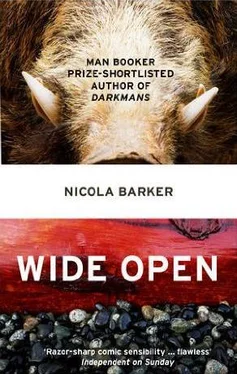I lie and I lie and I wonder what I am .
Ronny? M .
♦
Connie threw down the letter, knocked her glasses off and on to the desk, pushed her chair back and stood up. On the high-polished floor to her left was a powder-blue rug, fluffy and small. She sprang on to it, settled her weight and then kicked off. She had done this before, countless times.
She flew from the desk to the opposite wall, from the wall she flew to the bed and back again. She kept her balance exquisitely, and then, just as suddenly, she absolutely lost it. The rug tucked and gathered. It tipped. She felt the wooden boards jar and crack against her palms and her knees. “Ow!” she whispered, as a matter of form, and then she lay down flat on her stomach and pushed her cheek hard against the floor’s cold, wooden boards. She listened to their creaking as the blood pumped in her ears. She closed her eyes.
It was in this strange position that her mother discovered her.
♦
Lately, Lily had begun remembering things which she knew for a fact she’d done herself, as if somebody else had done them. Small acts of cruelty. Unjustifiable lies. Tiny injuries. Arguments. Plain observations. Whims.
Her brain — keen for mischief, for diversity — had started experimenting with notions of context, and meaning, and responsibility. Lily found herself experiencing certain intimate, everyday occurrences second-hand. She would remember actual events, but only as hearsay, as stories, or as interesting fragments of other people’s conversation.
Had she ever doubted her own judgement, questioned her own motivations or struggled against her worse inclinations, this development might have given Lily pause. But she never doubted herself. She was bold and wild and sure. This was how she survived.
Anyhow, that sheer ravine which suddenly seemed to exist between memory and action could be tantalizing when experienced, she felt, and sometimes liberating. Like a drug. Scary. Addictive. And, yes, there was the occasional bad trip, too. Inevitably.
“It must’ve been the fishy one who called me dirty,” Lily muttered, sulkily, pulling her brown bath towel tighter around her skinny midriff as she stared, shivering slightly, into Sara’s hen coop. “I never even spoke to the bald one before. I never even went near him.”
In her hand, Lily held a sharp blade. Her fingers were cold and clumsy. The hens clucked, to the rear of the coop, suddenly nervous, all in a cluster.
Sara walked the longest possible route for her own cautious reasons and ended up in the nature reserve, where you either went forwards or backwards but couldn’t easily meander. She wanted to meander though. She’d lost her nerve. To the right of the raised bank and footpath that she tripped along billy-goat-gruffly in her summer sandals — lay the salt flats and the sea; to the left, the freshwater river, and beyond that, just fields.
“I am a farmer’s wife,” she kept incanting, “and I farm boar.”
If she went on saying it then she could almost stop herself from hoping.
“I farm boar.”
The summer dress had been a mistake. Of course. She was no sophisticate and it was spitting.
“Fool’s rain,” she told herself, because while it seemed harmless, only a fool would consider venturing out into it unprotected.
“I am a farmer’s wife.”
It rained harder. It grew darker.
“I am ridiculous.”
Up ahead, to her left, stood a birdwatchers’ hide; mawkish and hutchy on its tall stilts. She wiped the rain from her cheeks and ran over to it. The wood was harsh and splintery under her wet hand. As she began to climb, cool sea air billowed out her skirt and slipped up the back of her dress with all the smart, fine scratch of a beak and a claw. She clambered up the steps, her dress snagging, her sandals clicking.
She’d never been in a hide before. She imagined that it would be black inside and that it would smell of dark things, of treacle and pitch. She presumed that all the peep holes and hatches would be closed, so prepared herself for the shock of darkness. The door handle was wet and turned loosely. She pushed at the door with her knee and clambered inside. The rain followed her. She shut the door and then leaned her back up against it, puffing out her cheeks in the sudden, hollow silence with a sense of genuine relief.
It did not smell sweet and treacly like she’d imagined. It smelled of fish. One hatch was slightly ajar. Its pegs had come free and its latch had slipped by an inch or so. Her eyes focused on this bright gap greedily, on the pearly raindrops that sprang through it and into the hide as if escaping from an infinite frying white heat outside.
But here it was black and warm. Sara stretched a tentative foot sideways to see if she could locate a bench. Her leg touched something woody. She bent over and felt for it, blindly. Her fingers grasped it. She found its corner and then exhaled sharply as her middle finger pushed into a splinter.
She cursed and sat down, at first miscalculating and almost missing the bench. But it was slim and backless so she straddled it like a rocking horse. She sucked her finger. Her tongue explored the nail and pad of her finger gingerly until it located the scratchy woodchip. The chip snicked her tongue’s tip and somehow thrilled her.
Her eyes were closed. Or were they? They were closed. But it made no difference. She imagined herself inside an oak casket. She’d gone and stowed herself away. She was wet and the rain on her lips was salty. She licked it. The fishy air. It was low and saucy. It smelled of sex. Of sealife. Damp and crude and tainted. Catfood. Pilchards. In oil, in oil.
Oh yes.
Under her left thigh lay a small bolt which held the top of the bench to its leg. It felt loose. She rocked herself. It wobbled. She shifted slightly and repositioned herself over it. It scratched and it niggled so delightfully. It found no focus. It had a clumsy accuracy. The best kind, she thought, and pulled up her wet skirts to feel her soaking thighs, her damp knees. The bench rocked. A little a little a little.
She felt her knee-bone, the fragile bits at the side, the gulf at the rear. She arched backwards and touched her calves, her ankles, her tinkling sandal buckles which she pulled open, yanking them off and tossing them sideways. Water dripped from her hair, on to her arms, down, down her throat. She was all at sea. She imagined Luke. Was that his name? He was a horse, a pit-pony, barrel-chested, round and solid, hard and musky. Strong hooves. Wide back. Glossy.
She rested her palms right behind her, clung on to the bench with her fingers. And she rocked and she rode, her toes pointing backwards, her hair pulling loose, her ankles aching, the letter D in flesh. Her breasts and her belly the curve, her stiff arms that letter’s lovely backbone. Punctuated, utterly, by that delicious bolt. But this was just a tiny part of a long, long sentence. A conversation. It wouldn’t end. It couldn’t. Not right there and not right then and not right now. Oh…
Where would it go? And owl Uh…how?
Mermaid, she panted, taking all things into account on this wonderful ramble into a scramble of nouns and sounds and resonance and consonants…asp…kedgeree…the arc of a boar’s tusk…oh yes, oh yes…salt, straw, honey…pockets, bacon rind, a little bruise…a giant ocean, grapefruit, whiskers…uh…ink, foam, clay, liquorice, see-saw, she-sore, sea shore…
She wanted more. She wanted so…go…flow…much more. She wanted that bench to break. She wanted to break its back before she broke her own. So she rocked it, she lunged, she pushed and she swivelled. Her arms were unhinging at their elbows, her feet were twisted, her chest all rent and rasping. Her neck and head were yanked and tilting.
Читать дальше
Конец ознакомительного отрывка
Купить книгу












